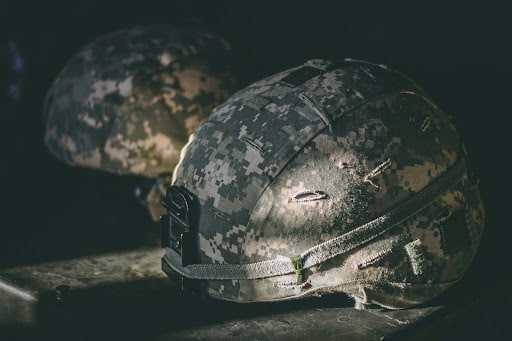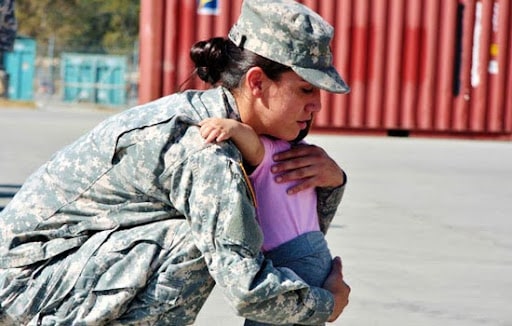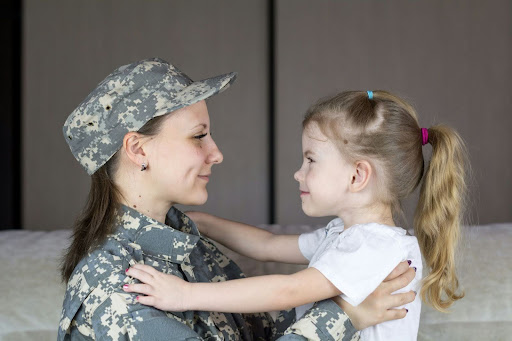Struggles Families Face During the Transition from Military to Civilian Life
Transitioning from military to civilian life is a profound change, not only for the service member but also for their entire family. The shift involves more than just a job change; it affects housing, social connections, routines, and personal identity. While veterans may feel the weight of adapting to a non-military world, their families face unique challenges as they try to acclimate to life outside the structured, supportive environment the military often provides. Understanding these challenges for the service members and their families is critical to ensuring a smoother transition and a successful civilian life.
Loss of Community and Support
Military families often describe their bond with other military families as akin to an extended family. The military community creates a strong sense of belonging built upon shared experiences, mutual support, and a collective understanding of the pressures that come with military life. For many military spouses, these connections are crucial, especially when service members are deployed for months. Military bases also often offer many resources, including access to healthcare, schools, child care, and family support programs.
However, these built-in support systems vanish when the family leaves the military. Suddenly, they may find themselves in a civilian neighborhood where few, if any, people understand what it is like to be a military family. The sense of isolation can be profound, particularly for spouses who lose the companionship of other military families. Children, too, may struggle as they leave behind friends who share the same lifestyle and enter schools where their classmates don’t understand the frequent moves, the deployments, and the constant uncertainty of military life.
How to Cope
Building new support systems is essential. Veteran service organizations like the Veterans of Foreign Wars (VFW) and the American Legion can be invaluable resources for veterans and their families. These organizations provide social connections and support for employment, education, and mental health. Families can also seek out local community groups, schools, and online forums to create new networks. For military spouses, finding peer support through social media or local veteran spouse organizations can help bridge the gap between military and civilian life.

Employment and Financial Adjustments
The financial shift is one of the most significant challenges for military families transitioning to civilian life. While on active duty, families often benefit from stable paychecks, housing allowances, and access to healthcare. Once the service member leaves the military, there is usually an adjustment period as they search for civilian employment. Veterans may struggle to translate military skills to civilian job markets, while military spouses who moved frequently during service may find their career prospects limited.
The sudden change in financial security can be stressful for families. Military life, with its steady structure and benefits, is replaced by the uncertainty of job searches, interviews, and potentially lower pay than what they were accustomed to in the military. Housing costs in civilian areas may be significantly higher for families accustomed to living on or near military installations.
How to Cope
Planning is key. Before leaving the military, service members can take advantage of programs like the Department of Defense’s Transition Assistance Program (TAP), which provides career counseling and employment workshops. Financial planning is another important step; consulting with a financial advisor who specializes in military transitions can help families manage their new budget and make the most of benefits like the GI Bill or VA loans. For spouses, pursuing certifications or training in fields that offer job flexibility can help ensure financial stability during the transition.
Changes in Identity and Purpose
A major challenge many veterans face after leaving the military is the loss of identity tied to their service. They’ve been part of a tightly-knit organization with a clear sense of purpose, discipline, and mission for years. That structure disappears when they leave, creating a void that can lead to feelings of confusion, purposelessness, or even depression. Veterans are not the only ones affected. Military spouses, who may have defined their identity around supporting their partner’s career and managing the household during deployments, can also struggle to find a new sense of self and purpose.
The children of military families may face a similar crisis. Military kids often grow up with a strong sense of pride in their parent’s service and may feel a loss of connection to the military lifestyle after their family transitions out. This sense of loss, combined with the challenges of adjusting to a new school or community, can make the transition difficult for the whole family.
How to Cope
Finding a new purpose takes time but is essential for long-term happiness. For veterans, focusing on education or retraining in a new career can provide a new direction. Volunteering or getting involved in community service can also help veterans and their families find a new sense of purpose. They can talk with a professional counselor about purpose and meaning. Spouses might consider pursuing personal goals put on hold during military life, such as furthering their education, returning to the workforce, or engaging in new hobbies. Ensuring open communication within the family is also important—acknowledging that everyone is going through a transition can foster understanding and support.

Emotional and Mental Health Struggles
The emotional toll of leaving the military can be significant for veterans and their families. Veterans may experience stress, depression, anxiety, or post-traumatic stress disorder (PTSD), particularly if they have served in combat. The abrupt change from a highly regimented environment to civilian life’s relative freedom and ambiguity can exacerbate these feelings. Military spouses, too, may experience anxiety or depression as they adjust to a new lifestyle, particularly if their service member is struggling with mental health issues.
Children are not immune to these challenges. Moving frequently and coping with the absence of a deployed parent can create anxiety and emotional difficulties for military children. When their family transitions to civilian life, they may feel unmoored and unsure how to fit in.
How to Cope
Professional help can make a significant difference. Veterans and their families should be aware of the mental health services available through the VA, including counseling, support groups, and programs designed for PTSD and other mental health conditions. Military OneSource, a Department of Defense program, offers free counseling services to veterans and their families the first year after leaving the military. Besides these governmental agencies, veterans and their families can find a mental health therapist in the community who understands the unique needs of military life and civilian life. In addition to seeking professional help, families should focus on maintaining open lines of communication so that emotional struggles can be addressed before they become overwhelming.
Navigating Healthcare and Benefits
Military families become accustomed to the healthcare system provided by the military. After leaving the service, accessing healthcare through the VA or civilian providers can be confusing and frustrating. Understanding how to use VA benefits, finding new healthcare providers, and managing the costs associated with civilian healthcare are all hurdles military families face during the transition.
How to Cope
Familiarize yourself with VA benefits and enroll in healthcare services as soon as possible after leaving the military. The VA’s website provides comprehensive information, and veterans service organizations often offer assistance in navigating the healthcare system. For eligible veterans, TRICARE can provide continued coverage after leaving the military, offering a bridge while veterans and their families establish new healthcare plans. In-network and out-of-network providers in that community can help process your insurance or provide you with a superbill to get reimbursed by your insurance.

Conclusion
The transition from military to civilian life is a complex process, particularly for families accustomed to the structure and support that military life provides. However, families can navigate these challenges successfully with planning, open communication, and a willingness to seek out new resources and support systems. By acknowledging the difficulties and actively working to cope with them, military families can make a smooth and fulfilling transition into civilian life.
More Articles About Transitioning to Civilian Life:
- Therapy for Military Families
- Reintegration After Deployment: Navigating the Transition Home
- Understanding the Unique Challenges Faced by Military Families
Online Therapy in Florida, Idaho, South Carolina, and Utah
At Calming Transformations Counseling, our therapists understand that transitioning from military to civilian life is difficult. It can cause anxiety, stress, depression, or relationship issues. We can help through online therapy in Florida, Idaho, South Carolina, or Utah or walk and talk therapy in Hillsborough County, Florida. Book an appointment or contact us today to schedule a session and take the first step toward a healthier, happier life. Remember, your mental health is important—take the time to care for yourself.
